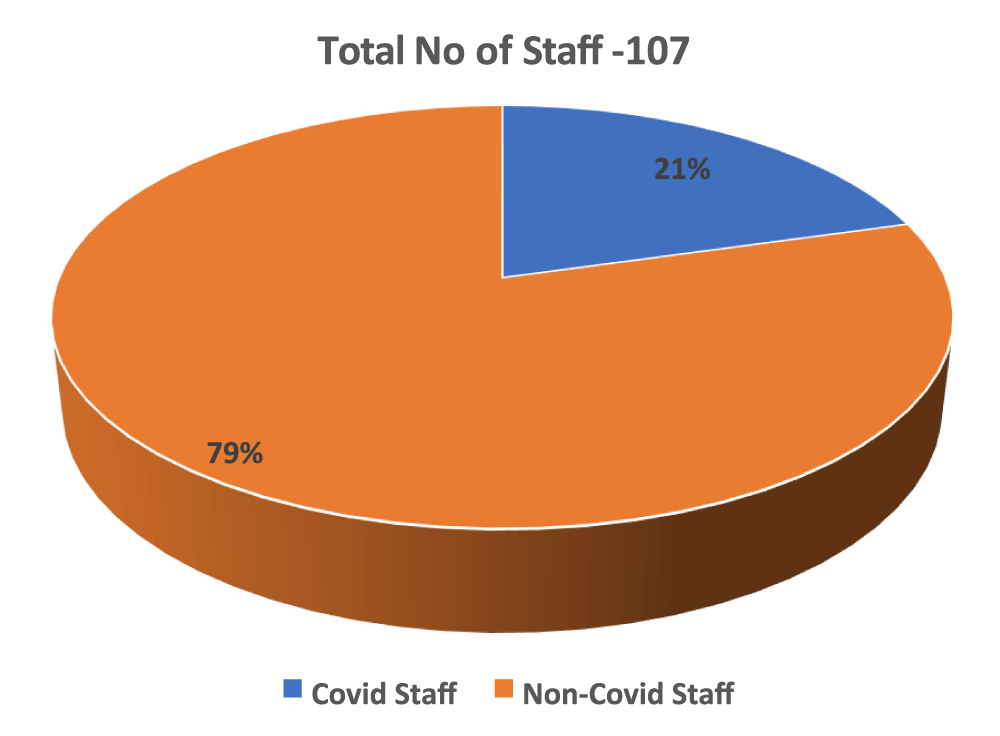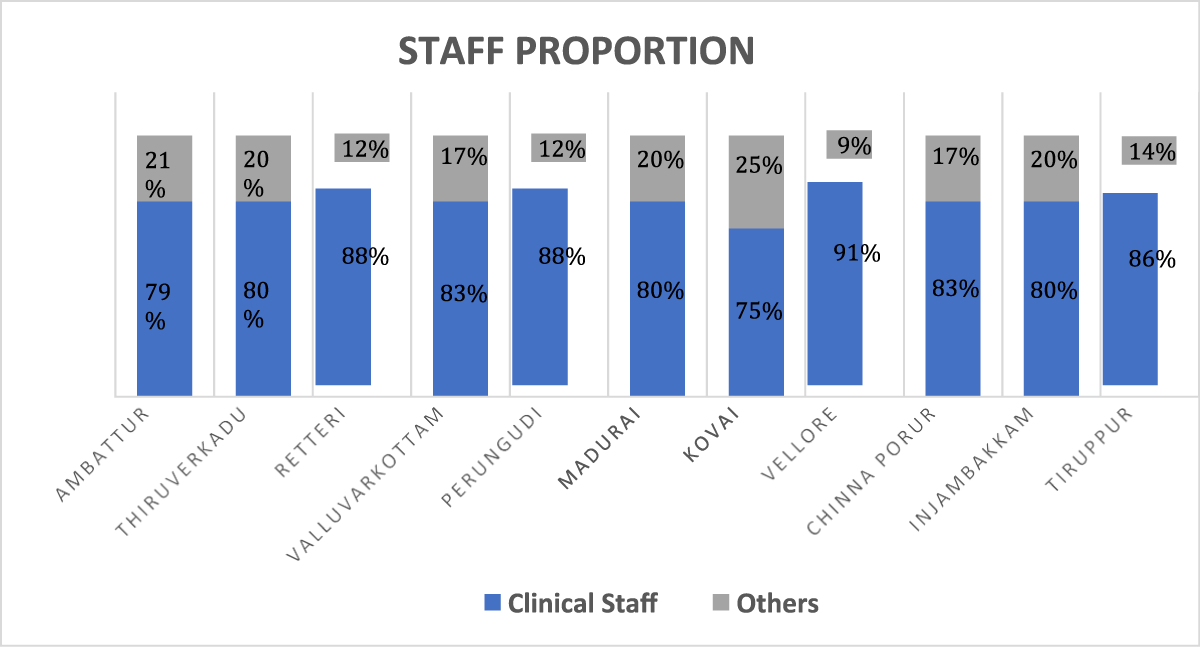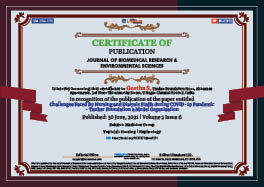> Medicine Group. 2021 June 30;2(6):529-531. doi: 10.37871/jbres1271.
Challenges Faced By Nursing and Dialysis Staffs during COVID-19 Pandemic - Tanker Foundation a Model Organization
Geetha S*, Guganathan M, Giridharan G, Umashankar V, Samuel G, Marteen N, Jagadeeshwari C, Vetrichelvi G, Jinu Kumar R, Abdul Sukur H, Amirtharani R, Thyagarajan N, Georgi Abraham and Latha A Kumaraswami
- Charity dialysis
- Dialysis staff structure
- COVID-19 pandemic
Abstract
Tamilnad Kidney Research Foundation (TANKER Foundation) which was established in 1993 to support kidney disease related care to underprivileged people. It has now eleven dialysis units in the state of Tamilnadu, India.
COVID-19 pandemic has put enormous challenges for the dialysis staff. Here we describe how we face the challenges from March 2020 till now without interrupting or closing down the dialysis units. The no of dialysis staff who have got infected are 21% which required only home quarantine and symptomatic remedies. Our experience can be emulated by other charity organization which provide kidney care.
About TANKER Foundation
Tamilnad Kidney Research Foundation (TANKER) was started in the Jun’1993 and completed 27 years of service for the underprivileged patients with kidney diseases. It is a not-for-profit organization and support the CKD patients with free of cost/subsidized dialysis. We have also meaningfully contributed to healthcare, research, training and advocacy for challenges related to kidney disease.
Over 250000 people die of kidney failure in India every year. It is the third largest cause of death after malignancy and heart disease. While supporting patients with kidney disease awareness and early detection are equally important to TANKER Foundation activities. We have reached out to more than 189,000 people through 1279 Awareness Programmes which were conducted at schools, colleges, law enforcement offices and public forums. We had screened 35,793 individuals for early detection of kidney disease through our 423 camps. TANKER Foundation, Kerala Kidney Research Foundation and St. Behanan’s Orthodox Church opened an awareness and screening centre at Vennikulam, Kerala on 3rd March 2021 to reach out to the needy. Research is an integral part of TANKER Foundation and this is rewarded by annual cash award, citation and medal on the “TANKER Day - 25th January” every year.
TANKER Foundation has 11 out-patient dialysis clinics spread across Tamilnadu, India and dialyzing regularly ≥ 650 patients through 154 dialysis stations and 6200 dialysis per month. In addition to nephrologist, there are 107 staff members who support dialysis on a regular basis.
TANKER Foundation provided uninterrupted dialysis service to the patients during COVID-19 pandemic from March 2020 through our staff, though many of our staff members and patients were infected. Our staff were frontline healthcare workers providing essential life- support. The patients and their relatives fully appreciated the dedication and their commitment and express their gratitude. As a result of complete lockdown, as the public transport system did not operate, our staff stayed in the dialysis unit to provide essential service.
Demographics of the Team (TANKER)
Among the 107 dialysis staff members, Males were 41 (38%) and Female 66 (62%) with the mean age of 32.0 ± 9.8 years. As per the socio-economic status, 54% belonged to lower strata and 46% from lower middle class. Their working experience varied from 6 month to 173 months with a mean of 42 months. Their working hours per week is a minimum of 50 hours as per labour law.
Among them, 58% were married and 42% unmarried. Among the married, 79% have children of different age group (Aged 0 to 119 months - 40%; 120 to 239 months - 40%; ≥ 240 months- 20%). The traditional joint family system prevalent in India still continues in our staff, spouses alone 70% and Joint family 30% which has an impact on the economic status of our staff in terms of sharing resources [1-5].
As GDP per capita income in India is USD 1305(INR 99,165), there is an enormous economic burden especially during pandemic with the lockdown massive job loss had a negative impact on wage less people. However, our staff who continued to work received regular remunerations enabling economic safety. This was possible because of the fund raising by TANKER Foundation and Government sponsored insurance and economic support to staff who required hospitalization (Figures 1,2).
Beyond this, the travelling time to the work is 37.1 mins ± 26.4 mins due to travel from different geographical area and also depends on the mode of transport. The distribution by public transport and private transport by the staff is 53% and 47% respectively. We have encouraged our staffs to overcome vaccine hesitancy by repeated counselling. This leads to completion of vaccination in 54% (Two doses) and 9% (Single dose) among our staff.
Conclusion
During the COVID-19 pandemic from 2020 March onwards, there have been innumerable challenges faced by both healthcare workers and dialysis patients belonging to their lower socio-economic status. TANKER Foundation, since its inception in 1993, have been addressing difficulties and key issues in providing dialysis service, early kidney disease detection and preventive care through our dedicated staff members.
The COVID-19 pandemic brought in many healthcare hazards which were faced with determination by our dialysis staffs in spite of many of them falling sick (21%) and few requiring hospitalization and deterioration in health. However, none of them among our dialysis staff had serious illness and complication as a result of COVID-19 infection. Those who have got infected were quarantined at home. This home quarantine worked effectively in rehabilitating our staff members though some of the spouses got infected showing minor degree of illness. The steadfast support given by the administration of TANKER Foundation which included transportation, boarding, overtime allowance set an example for other similar organization to be a model in patient care. It was sad for the staff to see and experience the passing away off some of our patients due to COVID-19 infection. The determination and constant communication between the staff in different units across Tamilnadu greatly improved the morale of our staff reducing the attrition rate to 16%. However, new recruitment of the dialysis staff and retention prevented downsizing our dialysis capacity hence supporting the survival of the patient while many healthcare facilities were forced to cut down the salaries of the staff. Tanker Foundation continued to pay the remuneration to our staff on a regular basis. This had a positive impact of loyalty and adherence to sincere work pattern by our dialysis staff. Some of the staff lost their close relatives due to COVID-19 pandemic which made them feel low in their professional work with no long-term impact on their quality of work.
We conclude by stating that TANKER Foundation dialysis staff stood the test of times and showed their ethical work pattern to the community, and admirable trait.
References
- Abraham G, Jayaseelan T, Matthew M, Padma P, Saravanan AK, Lesley N, Reddy YN, Saravanan S, Reddy YN. Resource settings have a major influence on the outcome of maintenance hemodialysis patients in South India. Hemodial Int. 2010 Apr;14(2):211-7. doi: 10.1111/j.1542-4758.2010.00441.x. PMID: 20529037.
- Abraham G, Vijayan M, Ravi R, Kumaraswami L, Venkatesan M. The impact of kidney foundations in alleviating the burden of CKD in India - an example, Tamilnad Kidney Research Foundation. Clin Nephrol. 2016 Supplement 1;86 (2016)(13):74-77. doi: 10.5414/CNP86S107. PMID: 27469149.
- Vijayan M, Radhakrishnan S, Abraham G, Mathew M, Sampathkumar K, Mancha NP. Diabetic kidney disease patients on hemodialysis: a retrospective survival analysis across different socioeconomic groups. Clin Kidney J. 2016 Dec;9(6):833-838. doi: 10.1093/ckj/sfw069. Epub 2016 Aug 17. PMID: 27994864; PMCID: PMC5162407.
- Abraham G. The challenges of renal replacement therapy in Asia. Nat Clin Pract Nephrol. 2008 Dec;4(12):643. doi: 10.1038/ncpneph0978. PMID: 19051369.
- Healthcare expenditure, public (% of GDP). World Bank data. 2015 March 9.
Content Alerts
SignUp to our
Content alerts.
 This work is licensed under a Creative Commons Attribution 4.0 International License.
This work is licensed under a Creative Commons Attribution 4.0 International License.










